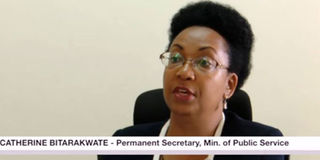Civil servants miss pay

Explained. Ms Catherine Bitarakwate Musingwire
What you need to know:
- Blame. In 2015, civil servants in Luweero District suffered a similar problem, but Ministry of Finance officials then blamed it on technical personnel at the district who had not yet mastered the use of Electronic Funds Transfer payment system.
LUWEERO. For three consecutive months, Ms Elina Daphne Nakalembe, 42, a primary school teacher in Luweero District, has not received salary.
The delay has been due to a mismatch in her Tax Identification Number (TIN), a new requirement for all civil servants to access their salaries.
A TIN is a unique 10-digit identifying number issued by Uganda Revenue Authority (URA) to prospective taxpayers to enable them meet their tax obligations.
Ms Nakalembe is an example of more than 80 per cent of civil servants in Luweero District who have consistently missed their salaries and are not sure when the money will be sent to their respective bank accounts.
“I have a family to look after, but I have not got salary for three months. We are told that the TIN which I presented does not match the TIN and e-mail address with the Uganda Revenue Authority. I believe the district has the capacity to sort out this problem without inconveniencing us. I have spent a lot of money making endless movements to the district headquarters,” Mr Edward Langoya, one of the affected teachers, told Daily Monitor on Wednesday.
A health worker, who asked not to be identified for fear of being victimised by her bosses, said she has not received salary for three months.
“I have moved to the district several times and the answer I get is that I will soon get salary. I was shocked to see my name pinned among the more than 300 civil servants who have wrong Tax Identification Numbers. I believe we have a communication gap with our supervisors,” she said.
Mr Ronald Ndawula, the Luweero District chairperson, said: “We are working hard to have this problem rectified. It is sad to see the workers failing to get their respective salaries at the end of the month yet they have dependents.”
The district deputy chief administrative officer, Mr William Makune Abwoli, said the migration of local governments from the Integrated Financial Management System (IFMS) Tier 2 to Tier 1 partly contributed to the delay in the release of staff salaries.
“It is true that some civil servants have not received their July salary. The problem with many of the affected workers is with the TINs, which is a new requirement for all civil servants. Many of the affected civil servants have now rectified the problem. We request the workers who have not yet accessed their salaries to cooperate by availing all the required information,” Mr Makune said in an interview.
Delay
Ms Catherine Bitarakwate Musingwire, the permanent secretary in the Ministry of Public Service, in a July 18 letter to all accounting officers, heads of government institutions, indicated the likely delay in payments for pension and the salaries due to migration of local governments from Integrated Financial Management System (IFMS) Tier 2 to Tier 1.
The immigration, she indicated, required the update of the human resource information of the public servants and pensioners in the affected local governments to enable alignment of their respective records in integrated personnel and payroll system with validated Supplier Numbers obtained from the Ministry of Finance, Planning and Economic Development.
“This process has affected normal timelines of the salary and pension processing for the month of July 2018,” Ms Musingwire, said in her letter.
Past incident
Blame. In 2015, civil servants in Luweero District suffered a similar problem, but Ministry of Finance officials then blamed it on technical personnel at the district who had not yet mastered the use of Electronic Funds Transfer payment system.


